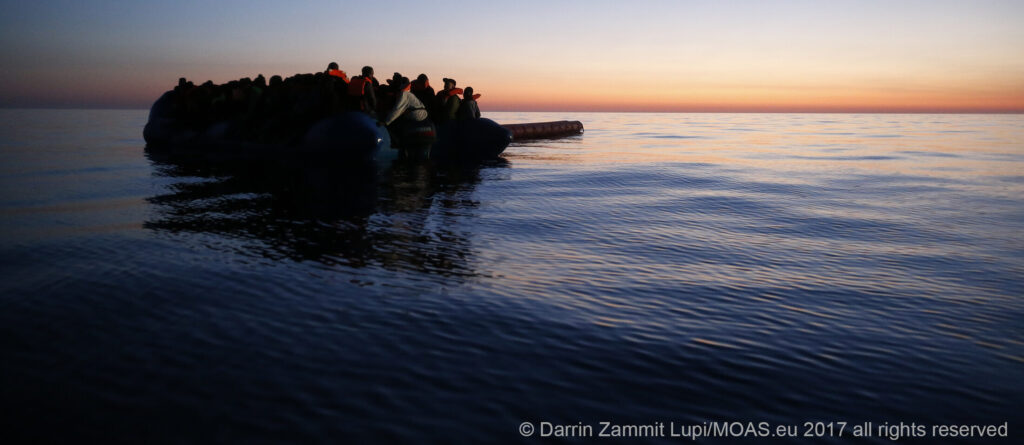Since 2014, 44,972 people have lost their lives in the process of migration towards an international destination. At least 18,503 people have died crossing the deadliest route, the Central Mediterranean.
It is estimated that at least 1,456 people died attempting to cross the Mediterranean to reach Europe in the first 6-months of 2021. Deaths across these routes have doubled compared to the same period in 2020. Furthermore, according to the EU border agency Frontex, the number of border crossings across the Balkan route has increased by 90% in the same period. There has been continued quasi-systematic use of pushbacks across the Balkan route, Aegean Sea and the central Mediterranean which have undermined asylum seekers rights. In an incident report ‘Crimes against humanity in the Aegean,’ released by Legal Centre Lesvos, of 17 recorded incidents of collective expulsion, ‘ survivors belongings were systematically confiscated, including their identity documents and personal belongings: preventing individuals from documenting the crime being committed against them, but also depriving individuals of the means to prove their identity and family relationships in any future claims for international protection.’ This report shows the extent of abuses occurring at this border, where migrants are also being beaten and abused as they attempt the crossing. These tactics adopted by border guards are not isolated to these incidences but have become part of an ever-widening culture of abuse across Europe’s external borders. ‘
Over 2,000 people have died trying to cross from Africa to Spain’s Canary Islands this year. The crossing from the African continent to Fuerteventura (one of the largest Canary Islands) should take an estimated 24 hours, however, the overcrowded migrant boats are in no way adapt to travel across such large stretches of open ocean. In August this year, a registered cargo ship came across a semi-submerged plastic motorboat some 150 miles from the Canary Islands. The crew discovered one 30yr old woman from the Ivory Coast who had been the last survivor of a group of 53 people who had set out from the Moroccan border 7 days prior. While the EU claims a moral responsibility for upholding asylum rights and securing legal and safe routes, the death toll along this migration route alone shows how the European borders remain largely impermeable for those seeking sanctuary.
In Belarus, at least 8 people have died as thousands of migrants, including those from Iraq, Iran and Syria, have tried to cross into the European Union in recent weeks but have been stranded in a densely wooded border zone without food or shelter, in plummeting sub-zero temperatures. At this border, we have seen the weaponization of migrants, as they are being increasingly used as political pawns. Non-Residents including journalists and aid workers are being barred from entering the 3km strip of the border as Warsaw declares a state of emergency for the area concerned. Poland has also sent 2,500 more troops to the area to help prevent crossings, with a total 10,000 troops now at the border.
An increasing number of asylum seekers and migrants are facing pushbacks in the Mediterranean Sea and are being returned to Libya. Libya should not be considered a safe port for disembarkation, there have been numerous reports attesting to the brutal treatment of migrants in Libyan detention centres, and countless accusations of human rights abuses. In October, Libyan guards at one centre shot and killed at least 6 migrants after authorities had rounded up over 5,000 migrants (including women and children) as part of a crackdown on smuggling. While no human traffickers had been identified or arrested, there had been a litany of abuses being perpetrated against migrants at Libyan centres during the violent crackdown. U.N – commissioned investigators have claimed the endemic mis-treatment of migrants in Libya amount to crimes against humanity. According to the Council of Europe, there is a ‘widening gap in migrant protection in the Mediterranean,’ and failures to respond to distress calls and the co-ordination of pushbacks to Libya are putting people’s lives even more in danger.
Safe and Legal Routes
As mentioned previously, when we are inundated with constant updates on the numbers of lives lost at sea, such news can instill a sense of apathy among readers, the numbers are hard to digest and the identities of those who make such dangerous crossings can be lost within the general narrative of the articles. These people are children, mothers, fathers, people fleeing war, poverty and in search of safety and a better future. We must continue to advocate for alternative pathways of migration and to raise awareness on the importance and need for #SafeAndLegalRoutes for migration so that people don’t have to risk their lives to reach safety. For more information about what Safe and Legal Routes are and how they can be implemented, access the blog here.
Final thoughts
Every life is important, every identity is unique and every statistic is a human being. Sensationalist news can bring about a general sense of fatigue as we feel unable to contribute in changing the story and outcomes, by joining our campaign, you can help MOAS tell a different kind of story – where every life is valued as we call for safe and legal routes.
If you are interested in the work of MOAS and our partners, please follow us on social media, sign up to our newsletter and share our content. You can also reach out to us any time via [email protected]. If you want to support our operations, please give what you can at www.moas.eu/donate.


